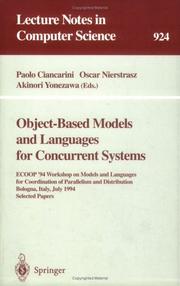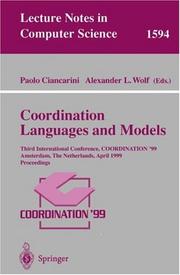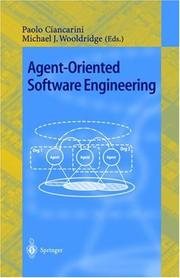| Listing 1 - 10 of 33 | << page >> |
Sort by
|

ISBN: 3540594507 3540492690 9783540594505 Year: 1995 Volume: 924 Publisher: Berlin: Springer,
Abstract | Keywords | Export | Availability | Bookmark
 Loading...
Loading...Choose an application
- Reference Manager
- EndNote
- RefWorks (Direct export to RefWorks)
This volume presents carefully refereed versions of the best papers presented at the Workshop on Models and Languages for Coordination of Parallelism and Distribution, held during ECOOP '94 in Bologna, Italy in July 1994. Recently a new class of models and languages for distributed and parallel programming has evolved; all these models share a few basic concepts: simple features for data description and a small number of mechanisms for coordinating the work of agents in a distributed setting. This volume demonstrates that integrating such features with those known from concurrent object-oriented programming is very promising with regard to language support for distribution and software composition.
Object-oriented programming (Computer science) --- Parallel programming (Computer science) --- Electronic data processing --- Congresses. --- Distributed processing --- Congresses --- Computer science. --- Computer network architectures. --- Software engineering. --- Operating systems (Computers). --- Programming Techniques. --- Computer System Implementation. --- Software Engineering. --- Programming Languages, Compilers, Interpreters. --- Operating Systems. --- Computer operating systems --- Computers --- Disk operating systems --- Systems software --- Computer software engineering --- Engineering --- Informatics --- Science --- Architectures, Computer network --- Network architectures, Computer --- Computer architecture --- Operating systems --- Object-oriented programming (Computer science) - Congresses. --- Parallel programming (Computer science) - Congresses. --- Electronic data processing - Distributed processing - Congresses.
Digital
ISBN: 9783540346951 Year: 2006 Publisher: Berlin Heidelberg Springer-Verlag GmbH
Abstract | Keywords | Export | Availability | Bookmark
 Loading...
Loading...Choose an application
- Reference Manager
- EndNote
- RefWorks (Direct export to RefWorks)
Book
Abstract | Keywords | Export | Availability | Bookmark
 Loading...
Loading...Choose an application
- Reference Manager
- EndNote
- RefWorks (Direct export to RefWorks)

ISBN: 354065836X 9783540658368 3540489193 Year: 1999 Volume: 1594 Publisher: Berlin: Springer,
Abstract | Keywords | Export | Availability | Bookmark
 Loading...
Loading...Choose an application
- Reference Manager
- EndNote
- RefWorks (Direct export to RefWorks)
We welcome you to Coordination ’99, the third in a series of conferences d- icated to an important perspective on the development of complex software systems. That perspective is shared by a growing community of researchers - terested in models, languages, and implementation techniques for coordination. The last decade has seen the emergence of a class of models and languages variously termed “coordination languages”, “con?guration languages”, “arc- tectural description languages”, and “agent-oriented programming languages”. Theseformalismsprovideacleanseparationbetweenindividualsoftwarecom- nents and their interaction within the overall software organization. This se- ration makes complex applications more tractable, supports global analysis,and enhances the reuse of software components. The proceedings of the previous two conferences on this topic were published by Springer as Lecture Notes in Computer Science 1061 and 1282. This issue of LNCS containing the papers presented at Coordination ’99 continues the tradition of carefully selected and high quality papers representing the state of the artin coordinationtechnology.In responseto thecallfor papers,wereceived 67 submissions, from which 26 papers were accepted. These proceedings also contain abstracts for posters presented at the conference. This year’s program features invited talks by Rocco De Nicola and Danny B. Lange. Reading through the papers, we expect that you may be surprised by the variety of disciplines within computer science that have embraced the notion of coordination. In fact, we expect this trend to continue, and hope that you will contribute to the on-going exploration of its strengths, weaknesses, and applications.
Parallel processing (Electronic computers) --- Electronic data processing --- Computer Science --- Engineering & Applied Sciences --- Distributed processing --- Computer science. --- Computer communication systems. --- Computer programming. --- Software engineering. --- Programming languages (Electronic computers). --- Operating systems (Computers). --- Computers. --- Computer Science. --- Programming Languages, Compilers, Interpreters. --- Operating Systems. --- Computer Communication Networks. --- Programming Techniques. --- Computation by Abstract Devices. --- Software Engineering. --- Computer software engineering --- Engineering --- Computer operating systems --- Computers --- Disk operating systems --- Systems software --- Informatics --- Science --- Operating systems --- Automatic computers --- Automatic data processors --- Computer hardware --- Computing machines (Computers) --- Electronic brains --- Electronic calculating-machines --- Electronic computers --- Hardware, Computer --- Computer systems --- Cybernetics --- Machine theory --- Calculators --- Cyberspace --- Electronic computer programming --- Electronic digital computers --- Programming (Electronic computers) --- Coding theory --- Communication systems, Computer --- Computer communication systems --- Data networks, Computer --- ECNs (Electronic communication networks) --- Electronic communication networks --- Networks, Computer --- Teleprocessing networks --- Data transmission systems --- Digital communications --- Electronic systems --- Information networks --- Telecommunication --- Cyberinfrastructure --- Network computers --- Computer languages --- Computer program languages --- Computer programming languages --- Machine language --- Languages, Artificial --- Programming --- Parallel processing (Electronic computers) - Congresses --- Electronic data processing - Distributed processing - Congresses
Book
ISBN: 9814560502 9814560499 Year: 2017 Publisher: Singapore : Springer Reference,
Abstract | Keywords | Export | Availability | Bookmark
 Loading...
Loading...Choose an application
- Reference Manager
- EndNote
- RefWorks (Direct export to RefWorks)
The topics treated in this handbook cover all areas of games and entertainment technologies, such as digital entertainment; technology, design/art, and sociology. The handbook consists of contributions from top class scholars and researchers from the interdisciplinary topic areas. The aim of this handbook is to serving as a key reference work in the field and provides readers with a holistic picture of this interdisciplinary field covering technical issues, aesthetic/design issues, and sociological issues. At present, there is no reference work in the field that provides such a broad and complete picture of the field. Engineers and researchers who want to learn about this emerging area will be able to find adequate answers regarding technology issues on digital entertainment. Designers and artists can learn how their skills and expertise can contribute to this emerging area. Also researchers working in the field of sociology and psychology will find how their experience and knowledge are connected to other areas such as technology and art/design. Although topics are written by foremost experts from the field, the description for each topic has been intended to be easily understandable but yet comprehensive enough so that it caters not only for the experts but also beginners and students in the field.
Engineering. --- User interfaces (Computer systems). --- Computer science --- Computer mathematics. --- Computational intelligence. --- Mass media. --- Communication. --- Social sciences in mass media. --- Computational Intelligence. --- User Interfaces and Human Computer Interaction. --- Mathematical Applications in Computer Science. --- Media Sociology. --- Mathematics. --- Communication, Primitive --- Mass communication --- Media, Mass --- Media, The --- Intelligence, Computational --- Computer mathematics --- Discrete mathematics --- Electronic data processing --- Interfaces, User (Computer systems) --- Construction --- Mathematics --- Mass media --- Sociology --- Communication --- Artificial intelligence --- Human-machine systems --- Human-computer interaction --- Industrial arts --- Technology --- Soft computing --- Computer science. --- Informatics --- Science --- Computer games --- Video games

ISSN: 03029743 ISBN: 3540415947 3540445641 9783540415947 Year: 2001 Volume: 1957 Publisher: Berlin, Heidelberg : Springer Berlin Heidelberg : Imprint: Springer,
Abstract | Keywords | Export | Availability | Bookmark
 Loading...
Loading...Choose an application
- Reference Manager
- EndNote
- RefWorks (Direct export to RefWorks)
One of the most important reasons for the current intensity of interest in agent technology is that the concept of an agent, as an autonomous system capable of interacting with other agents in order to satisfy its design objectives, is a natural one for software designers. Just as we can understand many systems as being composed of essentially passive objects, which have a state and upon which we can perform operations, so we can understand many others as being made up of interacting semi-autonomous agents. This book brings together revised versions of papers presented at the First International Workshop on Agent-Oriented Software Engineering, AOSE 2000, held in Limerick, Ireland, in conjunction with ICSE 2000, and several invited papers. As a comprehensive and competent overview of agent-oriented software engineering, the book addresses software engineers interested in the new paradigm and technology as well as research and development professionals active in agent technology.
Software engineering --- Intelligent agents (Computer software) --- Computer science. --- Computer communication systems. --- Software engineering. --- Computer programming. --- Computer logic. --- Artificial intelligence. --- Computer Science. --- Software Engineering/Programming and Operating Systems. --- Artificial Intelligence (incl. Robotics). --- Software Engineering. --- Logics and Meanings of Programs. --- Programming Techniques. --- Computer Communication Networks. --- Logic design. --- Artificial Intelligence. --- Design, Logic --- Design of logic systems --- Digital electronics --- Electronic circuit design --- Logic circuits --- Machine theory --- Switching theory --- AI (Artificial intelligence) --- Artificial thinking --- Electronic brains --- Intellectronics --- Intelligence, Artificial --- Intelligent machines --- Machine intelligence --- Thinking, Artificial --- Bionics --- Cognitive science --- Digital computer simulation --- Electronic data processing --- Logic machines --- Self-organizing systems --- Simulation methods --- Fifth generation computers --- Neural computers --- Computer software engineering --- Engineering --- Informatics --- Science --- Communication systems, Computer --- Computer communication systems --- Data networks, Computer --- ECNs (Electronic communication networks) --- Electronic communication networks --- Networks, Computer --- Teleprocessing networks --- Data transmission systems --- Digital communications --- Electronic systems --- Information networks --- Telecommunication --- Cyberinfrastructure --- Network computers --- Computers --- Electronic computer programming --- Electronic digital computers --- Programming (Electronic computers) --- Coding theory --- Computer science logic --- Logic, Symbolic and mathematical --- Distributed processing --- Programming --- Software engineering - Congresses --- Intelligent agents (Computer software) - Congresses --- Computer networks.
Book
ISBN: 303093134X 3030931358 Year: 2021 Publisher: Cham, Switzerland : Springer,
Abstract | Keywords | Export | Availability | Bookmark
 Loading...
Loading...Choose an application
- Reference Manager
- EndNote
- RefWorks (Direct export to RefWorks)
Book
ISBN: 9783540346951 Year: 2006 Publisher: Berlin Heidelberg Springer Berlin Heidelberg
Abstract | Keywords | Export | Availability | Bookmark
 Loading...
Loading...Choose an application
- Reference Manager
- EndNote
- RefWorks (Direct export to RefWorks)
This volume contains the proceedings of the 8th International Conference on Coordination Models and Languages, Coordination 2006. This year the conf- ence was part of a set of federated conferences named DisCoTec 2006, held in Bologna in June 2006. It was held in the series of successful conferences whose proceedings were also published in LNCS, in volumes 1061, 1282, 1594, 1906, 2315, 2949, and 3454. The conference was born in 1996, as a forum for researchers working on programming models, formalisms, and platforms for describing or supporting concurrent and distributed computations. Contemporary information systems increasingly rely on combining concurrentand distributed, and now also mobile, recon?gurable and heterogeneous components. New models, architectures, l- guages,andveri?cationtechniquesarenecessaryto copewith the complexity- ducedbythedemandsoftoday'ssoftwareindustry.Coordinationlanguageshave emerged as a successful approach, in that they provide abstractions that cleanly separatebehaviorfromcommunication,therebysupportingmodulardesign,s- plifying reasoning,and ultimately enhancing softwaredevelopment. Researchon coordination models and languages is still playing a crucial role in addressing the technological concerns of widely distributed applications and services. We received 50 submission. All papers were reviewed by four reviewers. The Program Committee used a tool for collaborative conference management to select 18 regular papers. The Program Committee invited Chris Hankin and Pierpaolo Degano to give talks.
Computer science --- Programming --- Artificial intelligence. Robotics. Simulation. Graphics --- Computer. Automation --- informatica --- programmeren (informatica) --- software engineering --- KI (kunstmatige intelligentie) --- robots
Digital
ISBN: 9789814560504 Year: 2017 Publisher: Singapore Springer Singapore, Imprint: Springer
Abstract | Keywords | Export | Availability | Bookmark
 Loading...
Loading...Choose an application
- Reference Manager
- EndNote
- RefWorks (Direct export to RefWorks)
The topics treated in this handbook cover all areas of games and entertainment technologies, such as digital entertainment; technology, design/art, and sociology. The handbook consists of contributions from top class scholars and researchers from the interdisciplinary topic areas. The aim of this handbook is to serving as a key reference work in the field and provides readers with a holistic picture of this interdisciplinary field covering technical issues, aesthetic/design issues, and sociological issues. At present, there is no reference work in the field that provides such a broad and complete picture of the field. Engineers and researchers who want to learn about this emerging area will be able to find adequate answers regarding technology issues on digital entertainment. Designers and artists can learn how their skills and expertise can contribute to this emerging area. Also researchers working in the field of sociology and psychology will find how their experience and knowledge are connected to other areas such as technology and art/design. Although topics are written by foremost experts from the field, the description for each topic has been intended to be easily understandable but yet comprehensive enough so that it caters not only for the experts but also beginners and students in the field.
Sociology --- Mathematics --- Applied physical engineering --- Mass communications --- Computer science --- Artificial intelligence. Robotics. Simulation. Graphics --- Computer. Automation --- neuronale netwerken --- fuzzy logic --- cybernetica --- sociologie --- communicatie --- computers --- informatica --- wiskunde --- KI (kunstmatige intelligentie) --- ingenieurswetenschappen --- computerkunde --- AI (artificiële intelligentie)
Digital
ISBN: 9789814560528 Year: 2020 Publisher: Singapore Springer Singapore, Imprint: Springer
Abstract | Keywords | Export | Availability | Bookmark
 Loading...
Loading...Choose an application
- Reference Manager
- EndNote
- RefWorks (Direct export to RefWorks)
The topics treated in this handbook cover all areas of games and entertainment technologies, such as digital entertainment; technology, design/art, and sociology. The handbook consists of contributions from top class scholars and researchers from the interdisciplinary topic areas. The aim of this handbook is to serving as a key reference work in the field and provides readers with a holistic picture of this interdisciplinary field covering technical issues, aesthetic/design issues, and sociological issues. At present, there is no reference work in the field that provides such a broad and complete picture of the field. Engineers and researchers who want to learn about this emerging area will be able to find adequate answers regarding technology issues on digital entertainment. Designers and artists can learn how their skills and expertise can contribute to this emerging area. Also researchers working in the field of sociology and psychology will find how their experience and knowledge are connected to other areas such as technology and art/design. Although topics are written by foremost experts from the field, the description for each topic has been intended to be easily understandable but yet comprehensive enough so that it caters not only for the experts but also beginners and students in the field.
Mathematics --- Mass communications --- Programming --- Artificial intelligence. Robotics. Simulation. Graphics --- Computer. Automation --- neuronale netwerken --- fuzzy logic --- cybernetica --- communicatie --- computers --- informatica --- massamedia --- externe fixatie (geneeskunde --- KI (kunstmatige intelligentie) --- interfaces --- AI (artificiële intelligentie)
| Listing 1 - 10 of 33 | << page >> |
Sort by
|

 Search
Search Feedback
Feedback About UniCat
About UniCat  Help
Help News
News